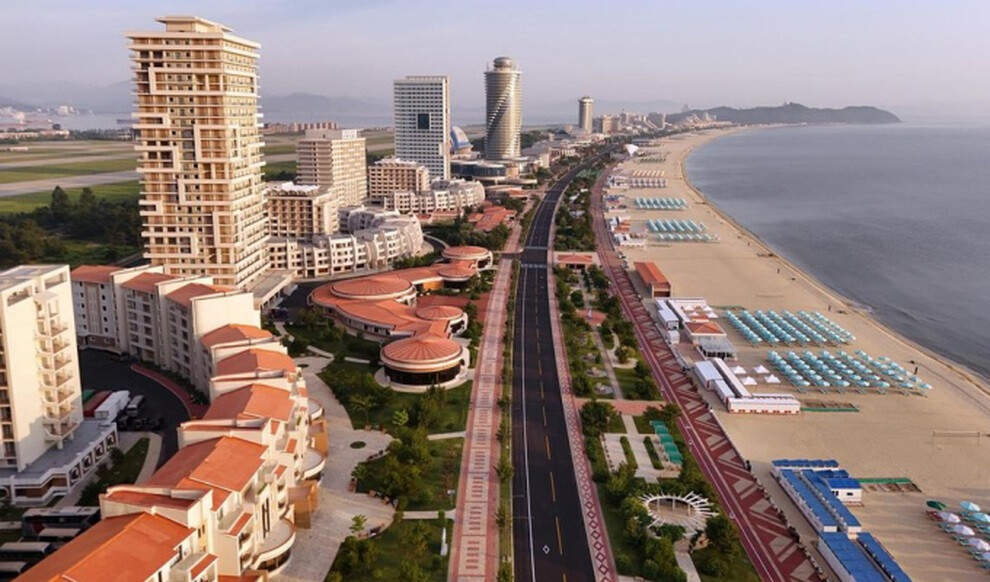
Wonsan, KCNA – North Korea's Wonsan-Kalma Coastal Tourist Zone in Kangwon Province, a large-scale beach resort promoted by the state, announced a temporary suspension of foreign tourist admissions starting July 15th, just two weeks after its opening on July 1st. This has drawn significant interest regarding the reasons behind the decision. The announcement was made via "Choson Tourism," a tourism information website operated by the DPRK's National Tourism Administration, but specific reasons for the suspension were not provided. Experts interpret this as either a measure to address initial facility defects or operational shortcomings, or as a result of a combination of factors including lower-than-expected demand from foreign tourists.
Ambitious Construction and Early Operational Halt
The Wonsan-Kalma Coastal Tourist Zone is a flagship project that has been under massive construction since 2014, under the direction of State Affairs Commission Chairman Kim Jong Un. Promoted as a symbol of self-reliance amidst strong Western sanctions against North Korea, it was developed into a modern, multi-purpose tourist complex spanning hundreds of hectares, featuring dozens of hotels, resorts, beaches, a water park, and even an aquarium. North Korea has shown its ambition to develop this area into an international tourist destination to serve as a crucial channel for earning foreign currency. Although initially scheduled to open in June, its opening was delayed until July 1st. In its initial phase of operation, it primarily focused on attracting Russian tourists.
Indeed, Russian Foreign Minister Sergey Lavrov visited Wonsan from July 11th to 13th and met with Chairman Kim Jong Un, where he praised the tourist zone, stating, "I am confident that more Russian tourists will visit this place." Russian media accompanied him and actively promoted the Kalma Coastal Tourist Zone. Earlier this month, the British BBC also reported that Russians had visited the Kalma Coastal Tourist Zone, and a week-long North Korea tour package, including a three-day stay, cost approximately $1,800 (about 2.5 million Korean Won). This amount is more than 60% higher than the average monthly salary of a Russian worker, suggesting that the high cost may have influenced tourist demand.
Expert Diagnosis: 'Breather' for Improvements
Regarding this temporary suspension, Professor Lim Eul-chul of the Institute for Far Eastern Studies at Kyungnam University analyzed, "North Korea will not abandon its policy of developing the tourism industry by attracting foreign tourists." He added, "The temporary suspension of foreign tourist admissions is a temporary measure to improve issues such as defects in buildings within the tourist zone or trial-and-error encountered during operations." This is interpreted as an intention by North Korea to identify and rectify problems that may arise during actual operation, even as it actively builds tourism infrastructure. North Korea previously accepted Western group tourists to the Rason Economic Zone in February of this year, the first time in five years since COVID-19, but this was also abruptly halted after three weeks, indicating a recurring pattern of "opening and then supplementing deficiencies."
The Dilemma of Tourism Activation and Control
North Korea seeks to utilize tourism as a primary means of earning foreign currency and a channel for exchange with the international community. It particularly pins its hopes on attracting tourists from China and Russia and has shown its commitment to developing the tourism industry through institutional reforms, such as the enactment of the Tourism Law in 2023 and the Wonsan-Kalma Coastal Tourist Special Zone Law in 2025. However, excessive control over tourists due to the regime's closed nature, poor infrastructure, and international sanctions continue to limit the development of North Korea's tourism industry.
This "temporary suspension" of the Kalma Coastal Tourist Zone is considered an instance that once again reveals the realistic challenges North Korea must overcome to achieve its goal of earning foreign currency through tourism. While it may be an expression of its will to welcome foreign tourists with perfect facilities and operational systems, it also suggests that beyond simply building facilities, quality of service and flexible policy operation are essential for North Korea to secure competitiveness in the international tourism market. Attention is now focused on how North Korea will address these issues and attract foreign tourists again in the future.
[Copyright (c) Global Economic Times. All Rights Reserved.]




























